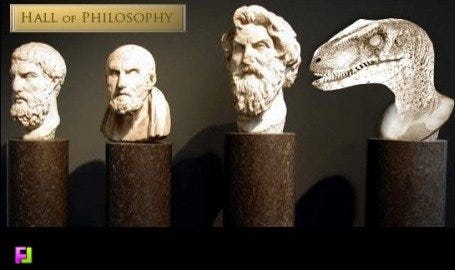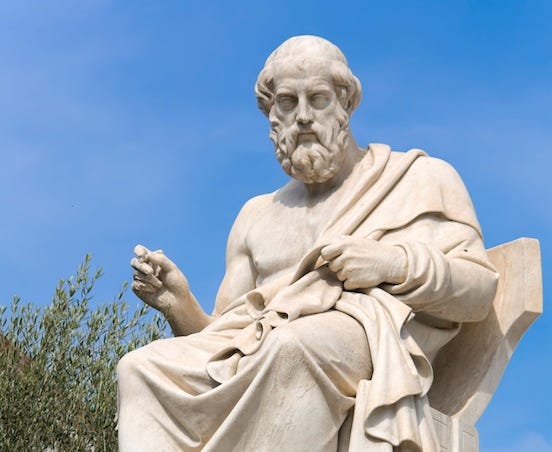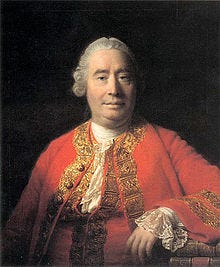My introduction to philosophy was largely through the great philosophers of the past -- the likes of Plato, Aristotle, Descartes, Hume, Kant. From the beginning, I was struck by how bad they were at thinking. Sometimes, they just seemed to be bad at logic, committing fallacies and non sequiturs that even an undergraduate such as myself could quickly see. Other times (almost always!), they seemed to have extremely poor judgment, happily proclaiming absurd conclusions to the world, rather than going back and questioning their starting points. I wondered why that was. Were these really the best philosophers humanity had produced?
Later, I figured out what (I think) was going on. These were not the best philosophers of the past that we were reading. They were merely the greatest philosophers. Skill at thinking was merely one criterion among many -- and not a particularly central one at that -- for 'greatness'.
Bad Thinking
"What? How dare he say such things about Plato, and Kant, and even David Hume! Who does this Huemer guy think he is??"
Well, not a great philosopher. Just a good one. Let me give you some examples of what I'm talking about. Incidentally, of the great philosophers, Aristotle is perhaps the best at thinking. Most of his errors are pretty reasonable mistakes, if you lived in his time. Plato, Hume, and Kant, on the other hand, are all very unreasonable, illogical thinkers.
Plato
In The Republic (book I), Thrasymachus says that government leaders rule solely for their own good, and treat the populace the way a shepherd treats sheep, to be used for their wool and meat. Plato has Socrates respond to this by arguing that the art of the shepherd, as such, is only concerned with the good of the sheep. He goes on to talk about how the art of medicine is concerned with health. He also claims that no one would agree to be a ruler without being paid.
This is all just a terrible way of responding to the challenge. Thrasymachus' statements about the sheep are just an analogy, which only serves to illustrate Thrasymachus' point -- whether shepherds really are concerned for the good of sheep is completely irrelevant. The relevant point is how leaders actually behave in the real world, which requires empirical evidence about leaders. Arguing about shepherds or doctors is pretty irrelevant to that, and arguing about what is the true "art" of medicine or of governing is definitely irrelevant. The one relevant point Socrates makes is that rulers would not be willing to rule without receiving payment. That, of course, is false. (But maybe this was less obvious in Socrates' time?)
This isn't an outlier case, either. The Platonic dialogues have these sorts of useless arguments by analogy all over the place.
Hume
The biggest problem with Hume was that he was constantly drawing absurdly skeptical conclusions, about almost everything, and this doesn't seem to bother him. He doesn't stop and say, "Wow, that sounds crazy. Maybe my starting assumptions are wrong?" This sort of dogmatism and lack of judgment is amazingly common among philosophers.
Here's an example of Hume's thinking. He starts with a hypothesis: all concepts (he calls them "ideas") are formed by your first having a sensory experience (which he calls an "impression"), and then your mind making a sort of fainter copy of that sensory experience. In brief: all ideas are copies of impressions.
Later, he notices that certain concepts really don't seem as if they could have been formed by copying impressions. For instance, the concept of the self, or the concept of causation as normally understood (I have to put that qualifier in there, because Hume also gives a revisionary account of causation). What would a rational person say at that point? "Ok, so my hypothesis was false. I wonder what the right account is?"
Not Hume. He just declares that we do not in fact have those concepts.
In another (in)famous passage, he talks about the "missing shade of blue": imagine a person who has seen many shades of blue, but there is one particular shade he has never seen. You show the person a series of color swatches, arranged by hue, with the swatch for that particular shade removed. Could the person imagine the missing shade? Hume agrees that the person probably could imagine it. Then he basically says, "Yeah, that's a counterexample to my theory, but it's a weird case, so let's not worry about it," then continues using his hypothesis as if it were a known fact.
Kant
We all know about Kant's ethical theory, centered on the "Categorical Imperative" (which has "three formulations" that are somehow one, kind of like the Holy Trinity). According to one formulation, you always have to act in such a way that you could will that the maxim of your action was a universal law. That's supposed to capture all of morality, and you have to follow that principle no matter what. E.g., if a murderer comes to your door looking for his intended victim, and the victim happens to be hiding in your house, you can’t just lie to the murderer and tell him the victim is somewhere else. Because you can’t will that everyone always lie.
What about Kant's argument for the Categorical Imperative? I bet you can't say what the argument was, can you? That's because almost no one covers it in classes or discusses it in the literature. And that's because it's completely unconvincing and not worth discussing, except to make points about bad arguments. Here is a key statement:
But if I think of a categorical imperative, I know immediately what it contains. For since the imperative contains besides the law only the necessity that the maxim should accord with this law, while the law contains no condition to which it is restricted, there is nothing remaining in it except the universality of law as such to which the maxim of the action should conform; and in effect this conformity alone is represented as necessary by the imperative.
There is, therefore, only one categorical imperative. It is: Act only according to that maxim by which you can at the same time will that it should become a universal law. (Foundations of the Metaphysics of Morals [1969], 44)
Got that? Okay, so that explains why you can’t lie to murderers to stop them from finding their intended victims.
How Bad Is That?
I note that the above are not examples of very subtle mistakes, nor are they attributable, say, to not having access to modern science or other modern discoveries. Those really are simply examples of people being very bad at thinking. No skilled thinker of any time should have said that kind of stuff. It’s not as if, e.g., you had to study quantum mechanics or predicate logic in order to realize that you should not cling to a hypothesis after finding multiple counter-examples to it.
Greatness
What Is It?
So that explains why I say those people are bad philosophers. But then . . . in what sense can they possibly be deemed great philosophers?
Well, being “great” in the sense of “the Great Philosophers” isn’t really about being good at thinking in the normal sense. (The normal sense of being good at thinking, I take it, is about forming beliefs that are supported by the available evidence and likely to be correct, and only forming such beliefs.)
Greatness, however, is more about influence. Western philosophy is a big, 2000-year+ conversation. The “great” philosophers are the participants who had the greatest influence on that conversation. They said stuff that other people found interesting, and kept thinking about, and telling other people about for centuries after the great philosophers’ deaths. That’s what a ‘great’ philosopher is – not a philosopher who said a bunch of true stuff based on good reasons.
The Greatness-Badness Connection
Saying true stuff based on good reasons is not incompatible with greatness in that sense. But it isn’t particularly conducive to greatness; in fact, it is strongly anti-correlated with greatness.
Why is that? Think about how one goes about influencing a conversation, and getting other people to talk about oneself. It’s not by saying the most reasonable things. It’s by saying things that are interesting or enjoyable to discuss. You can’t be completely stupid, or else people won’t want to talk about your ideas, but it actually helps if your ideas are implausible. If someone says, “Things are pretty much the way they seem here,” that’s not going to stimulate much discussion. It’s when someone comes up with an idea that is new and amazing or outrageous that other people want to talk about it.
For perhaps the best example, look at Kant. His idea of locating space and time in us is startlingly original. Wouldn’t it be amazing if that was true? Or Hume: isn’t it just outrageous and amazing how he argues against the justification of basically everything we know? Plato is kind of amazing too, with the whole realm of perfect circles, perfect Justice, etc., that the soul grasped before our birth.
But, of course, most ideas that are amazing or outrageous are also very badly wrong. And most arguments for such ideas are of course going to be bad arguments. And so, most people who believe such arguments and ideas are going to have to be bad at thinking – that is, not reliably oriented toward the truth. They’re going to be people with poor judgment and/or poor reasoning skills, since otherwise they’d realize that these amazing ideas are almost certainly wrong.
Our Confusion
Not everyone realizes all this. Most people, I suspect, believe that the Great Philosophers are actually good at philosophy. The reason they think this is that they know the Great Philosophers are the ones whom our ancestors have passed down to us, out of a large number of people who wrote and thought in the past. I guess people assume that “philosophy” or “fame” is sort of like a conscious agent, so if it chooses to focus on certain thinkers and certain works to tell us about, it must be that those are the best and most important things. Or at least very good and important.
But it doesn’t work like that. The current canon of Western philosophy is a spontaneous order, and the factors by which people were selected for inclusion need not involve truth or cogency of reasoning. There is no gatekeeper to say, “This idea is too obviously wrong; I’m not going to let people talk about it.”
Caveat
I don’t know the other thinkers of the past who didn’t get into the canon. So I don’t actually know if they were generally any better at reasoning than the Greats. So it could be that the Greats, despite how bad they were thinking, were still better than the other thinkers of their time.







Was Thomas Reid a good thinker?